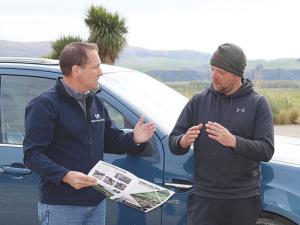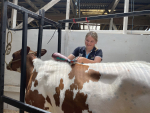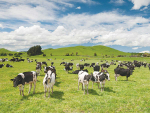The ability of dairy cows to use feed to produce higher quantities of milk is a genetics issue, says the world’s largest dairy farmer cooperative.
World Wide Sires vice-president global sales Scott Ruby said this during his annual visit to New Zealand to talk with farmers. He visited farms in the North and South Island.
“I oversee the really important markets around the world where things are happening, and a lot of the dairy world is watching what’s happening in New Zealand,” Ruby said.
“Over the last few years I’ve seen a gradual change in onfarm practice with more Kiwi farmers benefitting from supplementary feeding, enabling them to move from system 1 to 2 or 2 to 3.
“Dairy farming is a low margin business and farmers, everywhere around the world tend to be conservative in their approach to taking their farms to a higher cost model.
“But, regardless of location and farming system, globally dairy farmers share a common goal – to milk cows which are efficient converters of feed into milk solids.”
Most cows in NZ eat 15 - 17kgDM of grass forage per day with additional supplementary feeding taking them to 19 - 21 kgDM total intake per day.
Ruby said the genetics programme at World Wide Sires is focused on creating cows that can efficiently convert that dry matter intake into more kgMS while staying healthy, breeding back quickly and living for many lactations.
“A few years ago it was common to talk to farmers who, wanting to increase milk production, simply added to the size of their herd/s. That is all changing now – not only in NZ but worldwide. Today more farmers are concerned about the number of cows on their farms and are thinking more about increasing milk production by increasing production per cow instead of total cow numbers.”
Ruby said that on every farm he visited in the North and South Island, “the discussion turned to the environment and environmental policies”.
“I have two dairy farms in Oregon that have been under government environmental supervision since 1985 and we discussed a lot of the types of issues that we, as dairy farmers, deal with in managing our cows and being good stewards of the environment. Farmers generally don’t want to do one at the expense of the other so they to need to find a new balance -- a new approach.
“Our breeding programme at World Wide Sires has been working to develop blood lines that will create a more feed efficient animal that is smaller in size and doesn’t require as much energy for maintenance so she can put most of her energy into producing more kilograms of milk solids.
“Genomics has been the most positive tool we have had at our disposal in the last 15 years in the US and it has allowed us to increase the rate of genetic progress in producing more feed efficient cows. Today we have bulls developed from multiple generations of genomic breeding that are light years ahead of where we were 15 years ago.
“Genomics is a great tool but it’s only as valuable as the size of the database behind the genomic system. The advantage we have in North America, over New Zealand, is having a huge database made up of really high quality data. The quality of the data going in and the quantity of data we analyse is what makes our program the strongest in the world, and that allows us to make more rapid and consistent progress.
“We are creating a grazing style animal that can be more productive and efficient for New Zealand dairy farmers. She is moderately sized with a huge engine, able to convert DM into more kg of milk. Animals with this ability provide a new range of options for farmers which benefit the environment, the land, the animals and their lifestyles.”


















